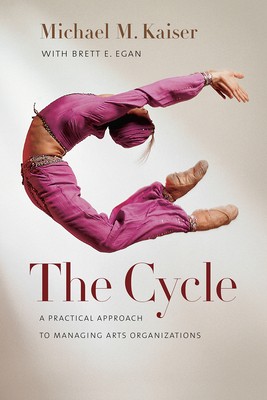
- We will send in 10–14 business days.
- Author: Michael M Kaiser
- Publisher: Brandeis University Press
- Year: 2013
- Pages: 212
- ISBN-10: 1611684005
- ISBN-13: 9781611684001
- Format: 16 x 23.6 x 2 cm, kieti viršeliai
- Language: English
- SAVE -10% with code: EXTRA
Reviews
Description
In the third book of his popular trilogy on creating and sustaining arts organizations, Michael Kaiser reveals the hidden engine that powers consistent success. According to Kaiser, successful arts organizations pursue strong programmatic marketing campaigns that compel people to buy tickets, enroll in classes, and so on--in short, to participate in the organization's programs. Additionally, they create exciting activities that draw people to the organization as a whole. This institutional marketing creates a sense of enthusiasm that attracts donors, board members, and volunteers. Kaiser calls this group of external supporters the family. When this hidden engine is humming, staff, board, and audience members, artists, and donors feel confidence in the future. Resources are reinvested in more and better art, which is marketed aggressively; as a result, the "family" continues to grow, providing even more resources. This self-reinforcing cycle underlies the activities of all healthy arts organizations, and the theory behind it can be used as a diagnostic tool to reveal--and remedy--the problems of troubled ones. This book addresses each element of the cycle in the hope that more arts organizations around the globe--from orchestras, theaters, museums, opera companies, and classical and modern dance organizations to service organizations and other not-for-profit cultural institutions--will be able to sustain remarkable creativity, pay the bills, and have fun doing so!
EXTRA 10 % discount with code: EXTRA
The promotion ends in 21d.21:17:03
The discount code is valid when purchasing from 10 €. Discounts do not stack.
- Author: Michael M Kaiser
- Publisher: Brandeis University Press
- Year: 2013
- Pages: 212
- ISBN-10: 1611684005
- ISBN-13: 9781611684001
- Format: 16 x 23.6 x 2 cm, kieti viršeliai
- Language: English English
In the third book of his popular trilogy on creating and sustaining arts organizations, Michael Kaiser reveals the hidden engine that powers consistent success. According to Kaiser, successful arts organizations pursue strong programmatic marketing campaigns that compel people to buy tickets, enroll in classes, and so on--in short, to participate in the organization's programs. Additionally, they create exciting activities that draw people to the organization as a whole. This institutional marketing creates a sense of enthusiasm that attracts donors, board members, and volunteers. Kaiser calls this group of external supporters the family. When this hidden engine is humming, staff, board, and audience members, artists, and donors feel confidence in the future. Resources are reinvested in more and better art, which is marketed aggressively; as a result, the "family" continues to grow, providing even more resources. This self-reinforcing cycle underlies the activities of all healthy arts organizations, and the theory behind it can be used as a diagnostic tool to reveal--and remedy--the problems of troubled ones. This book addresses each element of the cycle in the hope that more arts organizations around the globe--from orchestras, theaters, museums, opera companies, and classical and modern dance organizations to service organizations and other not-for-profit cultural institutions--will be able to sustain remarkable creativity, pay the bills, and have fun doing so!


Reviews